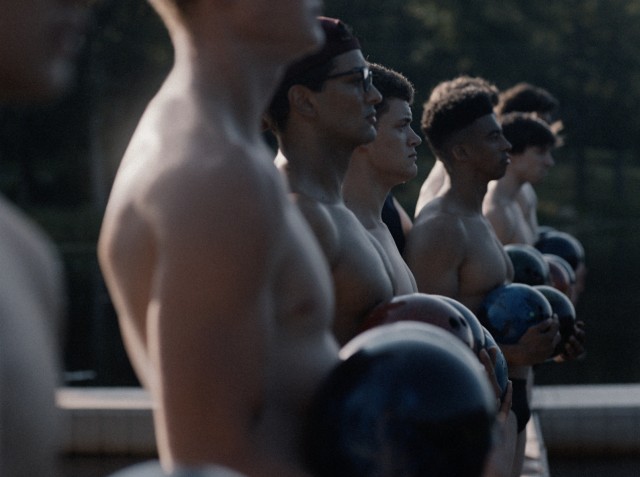It’s a tale as old as time: if you want to be part of the team, you have to pass the test, and it’s not the kind of test that’s standardized, sanctioned, or safe. If it were, it wouldn’t weed out the weak, and there’s perhaps nothing young men fear more than appearing soft and thin-skinned, especially in the deeply toxic world of high school and college sports in the United States. This is the myth of what it means to be a man, passed down like a family heirloom in a country whose culture has been famously plagued by a history of toxic masculinity and pervasive, violent traditions that lurk under the surface like rip tides.
Flounder – a tense, gripping drama from directors David and Sam Cutler-Kreutz – tells the story of a water polo team’s hazing ritual, and a few young men whose overwhelming desire to make the team causes them to blow through a series of dangerous tests with horse blinders on, worried their world will end if they don’t get a letter jacket. It’s also a story of the damned if you do, damned if you don’t choice a number of young athletes have to make when faced with gatekeepers who are dead set on doing things the way they’ve always been done, at whatever cost.

The wannabe team members line-up, awaiting the trial that will decide if they make the cut.
The setting is something out of a horror movie: a lake in upstate New York, populated with a group of impressionable youths and their slightly older tormentors, who grill them like drill sergeants and call them “beta cucks”. There are a number of young men that move around the scene like a Greek chorus of future frat bros, but our two main characters are Conner and Ben (played by Johan Gran and Charles Justo), two aspiring athletes who have the kind of friendship that’s real enough to have their own handshake. One of them is cautious while another one is confident. But this is a competition, and at the end of the day, each man is on his own.
From the start, co-directors David and Sam Cutler-Kreutz infuse the mood with that foreboding feeling you get deep in your gut when you know something’s bound to go wrong, but you don’t know exactly what that something is going to be. Like a nightmare brought to life, there’s an intensity and velocity to the film that propels the plot forward, and a claustrophobic atmosphere that’s furthered by much of the film taking place underwater – shot by cinematographer Gaul Porat in a way that makes you sort of never want to swim in a lake again. There’s not much wiggle room on a low budget film shoot, and the filmmaking team had a stroke of bad luck when the majority of the lake shoot day was canceled due to rain, but that’s the risk that comes with on-location filmmaking. There’s no sound stage to hide in when it rains. You might have to make some compromises, but if you figure out how to make it look convincing, no one will know the difference. Case in point? The directors told us that a lot of the underwater scenes were shot in a “a kiddie pool filled with 2000 pounds of sand”.

Rivals Conner (L) and Justin (Josiah Schneider) fight it out for a place on the team
There’s something to be said about the rewards of watching a 20-minute slow burn short film, but not everything needs lengthy exposition and an epilogue that lingers around like a friend who hasn’t taken the hint to leave your house yet. Clocking in at under ten minutes, Flounder is economically shot and well paced, and the film’s distillation of dramatic action works well. In a way, you want to live in this world for longer than you’re allowed to, but there’s a certain beauty to being given just enough of instead of too much. Ultimately, it hits the sweet spot of feeling wholly contained as a short film but capable of expansion, and any director who dreams of bringing a feature to life should aim for that mark.
All in all, the film is a haunting reminder of the dangers of hazing, and though young people may feel invincible, there are consequences for the dumb things we do before our prefrontal cortex is fully formed. People are supposed to care for each other, but there’s a difference between being on the same team and being a true friend, and in a sphere where so much value is placed on strength, stereotypical manliness, and popularity, it reminds us that certain things are more valuable than that.

 Adam Banks
Adam Banks